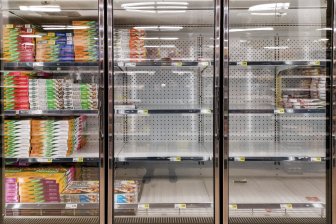Bank of England hikes rates by half point to 4% amid inflation fight – National | Globalnews.ca
The Bank of England raised interest rates by half a percentage point Thursday as it sought to tame double-digit inflation that is fueling a cost-of-living crisis, public-sector strikes and fears of recession.
The bank’s monetary policy committee voted 7-2 to push its key rate to four per cent, approving the 10th consecutive rate increase since a post-pandemic surge in the world economy and Russia’s war in Ukraine drove inflation to 40-year highs.
Economists suggest this may be the last big rate increase for Britain’s central bank as inflation begins to slow.
Read more:
U.S. Fed raises key rate, signals more to come even as inflation slows
Read next:
Nestle to chop, slice and freeze sales of Delissio, Lean Cuisine in Canada
“The extent to which domestic inflationary pressures ease will depend on the evolution of the economy, including the impact of the significant increases in Bank Rate so far,” the bank said in a statement. “There are considerable uncertainties around the outlook.”
The U.S. Federal Reserve has already started tapering its response, boosting its key rate by just a quarter-point Wednesday. The European Central Bank, meanwhile, is expected to go big again, with economists forecasting a half-point increase Thursday.
Optimism grew that rate increases may begin to tail off after U.K. inflation eased for a second straight month to 10.5 per cent in December, down from a peak of 11.1 per cent in October. That’s still far higher than in the U.S. and the 20-country eurozone, where inflation slowed to 6.5 per cent in December and 8.5 per cent in January, respectively.

With the cost of food and services rising and wage increases outstripping forecasts, the bank sent the message that it is serious about fighting inflation even as energy prices fall and concerns about sluggish economic growth take center stage.
“Global consumer price inflation remains high, although it is likely to have peaked across many advanced economies, including in the United Kingdom,” the bank said. “Wholesale gas prices have fallen recently and global supply chain disruption appears to have eased amid a slowing in global demand.”
After more than a decade of record-low interest rates, the Bank of England began raising borrowing costs in December 2021, when its key rate stood at just 0.1 per cent. The bank stepped up its fight against inflation last year, approving four big increases of a half-point or more since August to bring the rate to 3.5 per cent.
Read more:
Bank of Canada says it can pause rate hikes as inflation set to ‘decline significantly’
Read next:
When will winter end? Groundhogs make spring predictions in Canada
Inflation soared after Russia’s invasion of Ukraine fueled sharp increases in food and energy prices, leading to the U.K.’s biggest drop in living standards since the 1950s. That has triggered a wave of strikes – including the biggest day of industrial action in more than a decade on Wednesday – as nurses, train drivers, border guards and teachers demand pay increases.
The government is trying to prevent higher wages from causing a second round of domestically driven inflation that could be more difficult to tame.
Rising prices also are choking off economic growth and squeezing public finances as the government spends billions to help consumers and businesses hit by high energy costs this winter.
The International Monetary Fund this week said that the U.K. was on track to be the only major economy to shrink this year, even as the outlook for the rest of the world improves. The IMF said that the country’s gross domestic product was likely to contract by 0.6 per cent in 2023, compared with a previous forecast of 0.3 per cent growth.
Wholesale natural gas prices in Britain are down 75 per cent from their peak in late August, which will translate into lower costs for businesses and consumers in coming months.
© 2023 The Canadian Press
For all the latest World News Click Here
For the latest news and updates, follow us on Google News.




